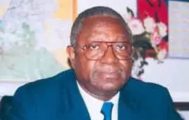Categories
Recent Posts
- Ukraine: Trump blames Zelensky for starting war after massive Russian attack
- Minister Obi Eta Jerome’s death – What do we know?
- Pope Francis transfers Cameroonian-born Nigerian Apostolic Nuncio in Sri Lanka to Ethiopia
- CDC banana exports hit 10,400 tons in Q1 2025
- Algeria to expel 12 French embassy officials
Archives
- April 2025
- March 2025
- February 2025
- January 2025
- December 2024
- November 2024
- October 2024
- September 2024
- August 2024
- July 2024
- June 2024
- May 2024
- April 2024
- March 2024
- February 2024
- January 2024
- December 2023
- November 2023
- October 2023
- September 2023
- August 2023
- July 2023
- June 2023
- May 2023
- April 2023
- March 2023
- February 2023
- January 2023
- December 2022
- November 2022
- October 2022
- September 2022
- August 2022
- July 2022
- June 2022
- May 2022
- April 2022
- March 2022
- February 2022
- January 2022
- December 2021
- November 2021
- October 2021
- September 2021
- August 2021
- July 2021
- June 2021
- May 2021
- April 2021
- March 2021
- February 2021
- January 2021
- December 2020
- November 2020
- October 2020
- September 2020
- August 2020
- July 2020
- June 2020
- May 2020
- April 2020
- March 2020
- February 2020
- January 2020
- December 2019
- November 2019
- October 2019
- September 2019
- August 2019
- July 2019
- June 2019
- May 2019
- April 2019
- March 2019
- February 2019
- January 2019
- December 2018
- November 2018
- October 2018
- September 2018
- August 2018
- July 2018
- June 2018
- May 2018
- April 2018
- March 2018
- February 2018
- January 2018
- December 2017
- November 2017
- October 2017
- September 2017
- August 2017
- July 2017
- June 2017
- May 2017
- April 2017
- March 2017
- February 2017
- January 2017
- December 2016
- November 2016
- October 2016
- September 2016
- August 2016
- July 2016
- June 2016
Featured
 Burkina Faso: Where vision meets discipline
Burkina Faso: Where vision meets discipline  Prosecution of journalists in Cameroon: European Parliament says enough red flags have been ignored
Prosecution of journalists in Cameroon: European Parliament says enough red flags have been ignored  1982-2025: How long will Biya hang on?
1982-2025: How long will Biya hang on?  How Biya and Archbishop Nkea protected the sanctity of the family in Cameroon
How Biya and Archbishop Nkea protected the sanctity of the family in Cameroon  October Presidential Election: Will 92-year-old Biya be re-elected?
October Presidential Election: Will 92-year-old Biya be re-elected?
Most Commented Posts
 4 Anglophone detainees killed in Yaounde
4 Anglophone detainees killed in Yaounde
18 comments Chantal Biya says she will return to Cameroon if General Ivo Yenwo, Martin Belinga Eboutou and Ferdinand Ngoh Ngoh are sacked
Chantal Biya says she will return to Cameroon if General Ivo Yenwo, Martin Belinga Eboutou and Ferdinand Ngoh Ngoh are sacked
13 comments The Anglophone Problem – When Facts don’t Lie
The Anglophone Problem – When Facts don’t Lie
12 comments Anglophone Nationalism: Barrister Eyambe says “hidden plans are at work”
Anglophone Nationalism: Barrister Eyambe says “hidden plans are at work”
12 comments Largest wave of arrest by BIR in Bamenda
Largest wave of arrest by BIR in Bamenda
10 comments
Latest Tweets
Featured
-

Ukraine: Trump blames Zelensky for starting war after massive Russian attack
-

Minister Obi Eta Jerome’s death – What do we know?
-

Pope Francis transfers Cameroonian-born Nigerian Apostolic Nuncio in Sri Lanka to Ethiopia
-

CDC banana exports hit 10,400 tons in Q1 2025
-

Algeria to expel 12 French embassy officials
-

US: 7 900 Cameroonians face deportation
-

Burkina Faso: Where vision meets discipline
© Cameroon Concord News 2025
15, August 2019
African leaders join Macron at commemoration of WWII landings in Provence 0
President Emmanuel Macron saluted Thursday a French army “that emerged from the shadows and exile” during the Allied landings on the Mediterranean coast 75 years ago and the sacrifices by fighters from France’s former colonies in Africa.
“The glory of all these soldiers of the Liberation is immense, and our gratitude must never fade. We will never forget anything, nor anyone,” Macron told veterans at the Boulouris national cemetery in Saint-Raphael.
He was joined by the presidents of Guinea and Ivory Coast, Alpha Condé and Alassane Ouattara, for a ceremony marking the 1944 operation which saw French forces take a lead role in freeing their country from Nazi Germany’s grip.
Only a handful of French soldiers had taken part in the Normandy landings a few weeks earlier, which for decades overshadowed the Provence landings that were nonetheless crucial in turning the war’s tide.
The offensive included the remnants of France’s free forces as well as thousands of soldiers from its African colonies.
“For decades these African fighters did not have the glory and the esteem they deserved for their bravery,” Macron said, adding that through their spilled blood, “France has a part of Africa in it.”
He urged the mayors of towns and cities to name streets and public squares in honour of soldiers from Tunisia, Algeria and Morocco as well as West Africa.
“These men make all of Africa proud, and express the essence of France: a commitment, a love of liberty and greatness, a spirit of resistance united by courage,” Macron said.
Condé also lauded the “shared memory of the French and African people,” saying that without the sacrifice of the colonial fighters, “humanity would not be able to keep fighting for peace.”
‘Nancy has a stiff neck’
Besides accelerating the German retreat, the Mediterranean landings were hugely symbolic for a French nation eager to emphasise its role in its own liberation.
“After the humiliating defeat of 1940, seeing a French army free national territory showed the entire world that France has the ability to fight with an established army,” said Florimond Calendini, director of the national memorial of the landings, in Toulon.
Some 450,000 Allied soldiers using more than 2,000 ships took part in Operation Dragoon, including 250,000 French fighters, with most of the rest from the US.
The French launched the assault shortly after midnight on August 15 by scrabbling up the rocky cliffs at Cap Negre, named for the rock’s dark colour.
Resistance fighters in the south had been alerted to the impending offensive the night before, when underground radio sent a series of coded messages using seemingly anodine phrases such as “Nancy has a stiff neck.”
As during the Normandy landings, locals would play a key role in harassing German forces as they fell back, helping the Allied soldiers to advance must faster than in the north.
Hitler ordered a retreat from southern France as soon as August 17, except for the strategic ports of Toulon and Marseille, but these fell within 10 days.
“In less than two weeks, all of Provence was liberated. It was a huge surprise for the Allies,” Calendini said.
Overlooked legacy
At the time, France’s “Army B” consisted of nearly 600,000 men, two-thirds of them from African garrisons in countries still under French colonial rule.
The force included around 233,000 “Muslims”, as they were referred to at the time — including Moroccan battalions and infantry sections from Algeria, as well as fighters from Senegal and other West African colonies.
There were also so-called Marsouins (“porpoises”), recruits from France’s territories in the Pacific or the Caribbean.
African troops in particular paid a heavy price, with 55,000 killed over the course of World War II.
Yet for years their sacrifices were largely overlooked by most French, and in 1959 the government added injury to the insult by capping their military pensions as African nations gained their independence.
France finally agreed in 2002 to increase the payouts to partially make up for the veterans’ lost spending power over the subsequent decades — though they were still far below those of French ex-soldiers.
Pressure continued to mount until then president Nicolas Sarkozy announced in 2010 that pensions would be the same for all its veterans, regardless of nationality or place of residence.
Sarkozy was the only former French head of state to attend the ceremony Thursday at Boulouris.
(AFP)